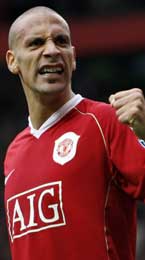|
|
RIO: MY STORY By Rio Ferdinand with Shaun Custis, Headline, £6
Rio Ferdinand may have a story to tell. But neither he nor his collaborator Shaun Custis, the chief football writer for The Sun, can rescue this book from the unsympathetic reviewer. Rio: My Story is just one more of the much-hyped but rather tame autobiographies that are being churned out by English footballers well before their careers are over. With names such as Frank Lampard, Wayne Rooney, Steven Gerrard and Ashley Cole on the list, why should Ferdinand be an exception? After all, he has twice been the world’s most expensive defender and the most expensive British footballer in history when he joined Manchester United in 2002.
The reason why Ferdinand chose to write this book is the sense of being unjustly treated, and made an example of, that still haunts him. Despite his stellar performances in the 2002 and 2006 World Cups, Ferdinand remains a categorical bad boy because England infamously dropped him for missing a drugs test in 2003. Back in 2000, he had been involved in a sex-tape scandal in Cyprus. And there were the usual drunk-driving offences, including one that made Glenn Hoddle drop him from a 1997 World Cup qualifier against Moldova, which would have been his international debut.
Thus, one picks up Rio partly in anticipation of a revelation of sorts, partly for entertainment. The book disappoints on both counts. Not only does it read like a transcribed interview but it also sounds like a prolonged rant, split into chapters to help the reader catch his breath or go to the loo. As for his side of the ‘story’, the book only confirms what most tabloid readers have always known — that Rio Ferdinand is rich, roguish and conceited. In fact, he is not even apologetic about most of his misdemeanours. Ferdinand’s defence against missing the drugs test at the time was that he had forgotten about it. The book does little else than re-iterate the old argument. One would have expected a more dramatic presentation of the players’ strike against his eight-month ban and the support he received from Manchester United. But a footballer’s limited vocabulary often leaves the most dramatic episodes of his life half-articulated. Yet, Rio could have been a treasure-trove of a player’s views from the pitch — from the centre of the storm — something that even the best analysts of the game cannot manage. Instead, almost every second setback in Ferdinand’s career or someone else’s is summed up with the phrase, “I/he was gutted.” Despite the more-or-less linear narrative, the reader’s primary difficulty is putting Ferdinand in perspective and forming a good idea of what the guy is like.
But this failed treatise of self-justification does offer insights into the Peckham neighbourhood Ferdinand grew up in, as well as into race relations and teenage crime-rates that he desires to improve. Besides trivia, there are glimpses of interesting personalities like Harry Redknapp, Terry Venables, Glenn Hoddle and Paul Gascoigne. The beleaguered Hoddle, for instance, is depicted as one of the most analytical coaches England has ever had. The football sections are undoubtedly the most readable in the book but the sport too remains inadequately explored, even the colourful photographs are accompanied by very unimaginative captions.
Rio Ferdinand wants people to know that he is a decent human being after all. And he may be one for all we know. But the moral of this book seems to be “Fool around, but don’t get caught.”












